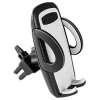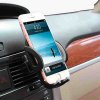Had a Garmin Nuvi years ago. Worked really well, and never led me astray. Was especially nice when I was doing a lot of motorcycle touring. But that was like 15 years ago. Since then, every car/truck I’ve owned has had nav built in, so now I use those, with the phone (sometimes 2) backing the main unit up.
Anymore, your phone can be just as good, if not better, than a stand-alone GPS unit (depending on phone/app/usage). All smart phones have a GPS chip in them, supplemented be cellular location. The higher end phones also have much better processing power than even the most expensive GPS units, as well as longer battery life, portability, etc. When you consider that even just a mid-level standalone can run $200-300, the mini computer you already carry with you every day is a pretty attractive alternative. The only downsides to using a phone are that the GPS antenna may not be as strong, an older, or lower end phone may not run some of the apps as well, and out in the field, you may not get as much battery life (important if your using it for hiking trips and such).
For the phone, there are actually lots of good GPS apps out there. Really just depends on what you want out of it, and if you want it free or not. For the car, I’d recommend Waze. It’s seems to be the standard right now, mainly because it’s free, and all the information on traffic, road closures, etc. is updated livetime by users. But there are a lot of others out there. Try a few out, and see what works for you.
There’s also lots of apps out there for hiking, etc, if you’re looking for something more like a Garmin eTrex type of GPS unit. The only caveat is, you’ll need to determine your usage before switching over to a phone app. For a week long hike, you’re gonna kill your phone battery well before a designated unit, and for kayaking and such, most phones are not waterproof. But, with a good compass app, and something like the AllTrails, Hiking Project, or even just downloaded topo maps, you could easily replace an eTrex for most uses. Just be mindful of whether the apps your using require cell service, or have an offline mode.


